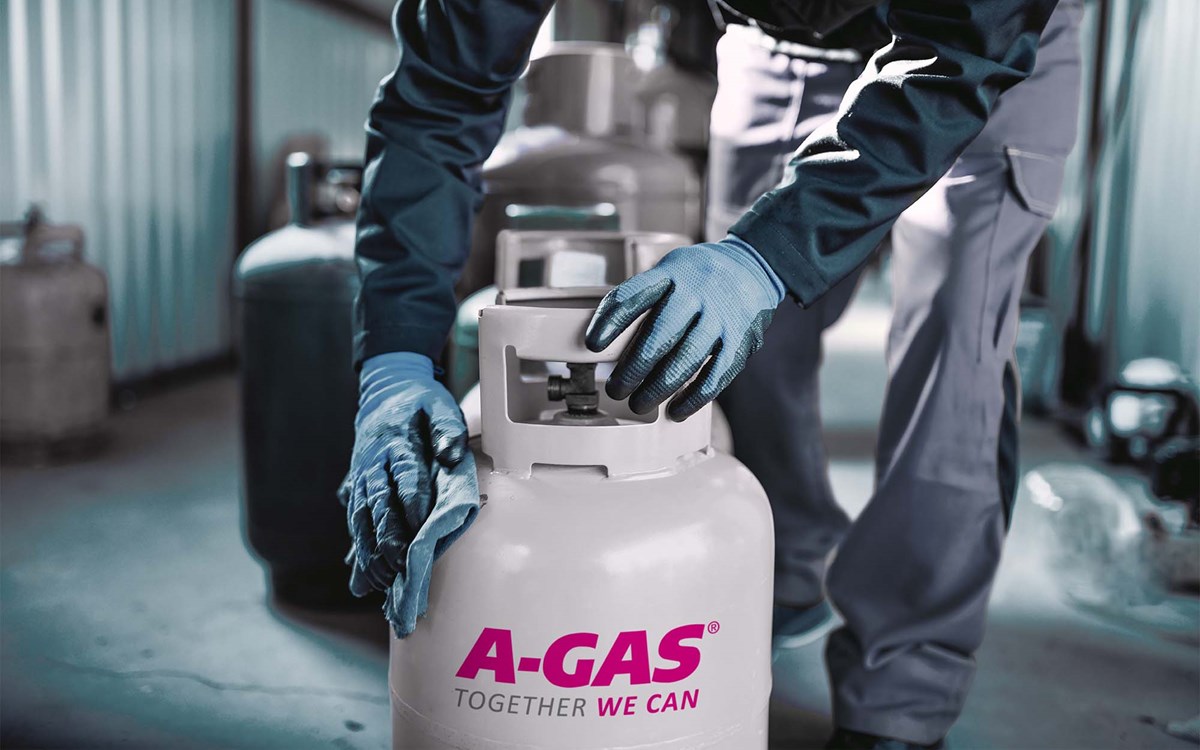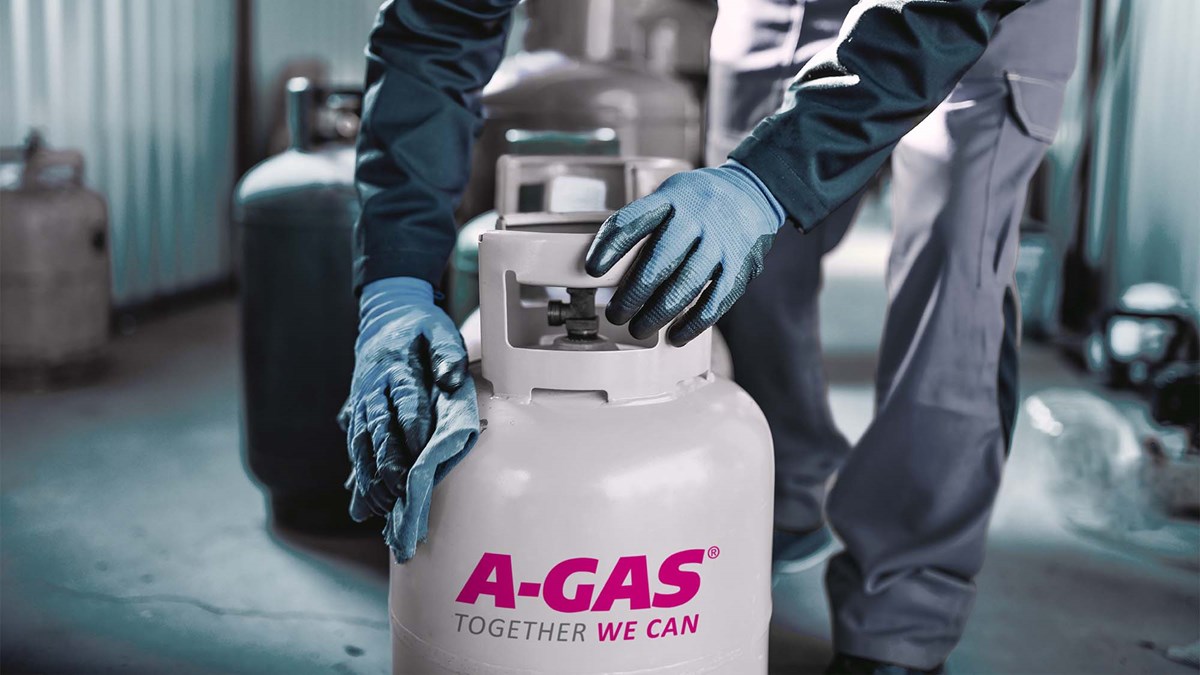Meeting the Low Carbon Challenge
A-Gas Managing Director, John Ormerod looks ahead to next year with optimism and explains how the company is aiming to be a net zero business by 2035.

Refrigerant recovery and reclamation have a big role to play as we look ahead to what’s happening next year. The continued challenges presented by the F-Gas Regulation step downs are leading the industry to change the way it operates but other forces will also have an influence on how we work.
We have the further pressures forced upon us by the Covid-19 pandemic and the rising cost of raw materials, energy and transport. We are still coming to terms with Brexit and the fall-out from our departure from the European Union. Skill shortages have been with us for some time, and this is all happening with the backdrop of the slow switch to low carbon heating, and cooling in homes and workplaces.
But it’s not all bad news and there are some straightforward measures our industry can take to ease these difficulties. Opting to re-use the resources we have already is a practical first step on the road to creating a low carbon society and relieving pressures on the industry.
Experts know that refrigerants saved from disposal and returned to use as reclaimed gases can make a direct contribution to the reduction in the use of virgin refrigerants and ensure that the industry remains within the limits imposed by the quota system.
Reclaimed refrigerant sent to A-Gas reprocessing centres undergoes chemical analysis, is cleaned of contaminants and goes through our separation plant to create a product that matches that of virgin refrigerant requirements.
Refrigerant sent to A-Gas reprocessing centres becomes fully reclaimed product and is returned to the market in line with the AHRI 700 standard. This is an excellent example of the Circular Economy at work – the opposite to the take, make and dispose business model – and forces us to seek greater efficiencies and make better use of what we have already.
Reclaimed refrigerant is quota free and gases saved from disposal and returned to use reduce the carbon footprint of the industry. They also save on raw material usage, energy consumption and unnecessary transport normally associated with virgin production.
Tools that make refrigerant recovery easier and quicken the process are valuable. The A-Gas Rapid Recovery, F-Gas compliant on-site recovery service, is a good example of how having the right equipment can make a real difference when it matters. The ease with which the refrigerants are removed is made possible by the mobile A-Gas Rapid Recovery unit.
The quota system has been in place since January 1 to govern the import and export of HFC refrigerants between Great Britain and the rest of the world including the EU. This system controls the amount of virgin gases passing between us and the outside world and ensures that we keep to the rules laid down by the F-Gas Regulation.
Virgin HFC refrigerants feature in the quotas but reclaimed gases are unaffected. This means the more we can reclaim, the more we can sell outside the quota system and in turn make available to the market.
More change could also be on the way as the F-Gas Regulation goes out for consultation for further amendment in 2023-2024. This review will happen in the UK and in European Union countries and who knows we could end up with the two F-Gas systems going in differing directions.
What is clear from the early discussions around the review, is that both the EU and the UK are planning to be more ambitious with the revision. This will likely mean a more aggressive phasedown and potentially more bans on particular applications for HFCs. Reducing emissions from the RACHP sector is a key part in helping countries achieve their net zero commitments.
To highlight our own commitment to low carbon policies and practices, A-Gas is pledging to become a net zero company by 2035. We are also aiming to reduce our existing emissions by 50 per cent by 2028. This not only aligns with the goals of the Paris Agreement, but brings our emission reductions in line with those mandated by science-based targets. These are ambitious plans but achieving them grows more important every day.
To support our journey towards net zero, we have launched a dedicated Towards Zero, Together campaign, where targeting net zero is top of our agenda and will be incorporated within our existing ISO Safety, Quality and Environmental management systems.
This campaign’s foundational principles are:
Targeting zero - encompassing our dedication to stay safe, protect our environment and prevent emissions to the atmosphere.
Zero harm – striving for zero harm in all we do so we can all go home after work in the same condition as we arrived.
Zero leaks – committing to targeting zero leaks to the atmosphere to protect each other and the environment we all share.
Zero carbon – striving to work towards a zero carbon footprint at all our locations across the A-Gas group by reducing our emissions as much as possible and offsetting what cannot be reduced.
We are taking a series of measures within A-Gas to ensure that these commitments do happen. This includes assessing our company-wide carbon footprint to measure and manage direct and indirect emissions based on the widely accepted Greenhouse Gas Protocol accounting standards. All our measurements will be independently verified and used as a benchmark to set the standard for continuous improvement.
We are also planning to measure emissions by including product lifecycle assessments on our substantial range of circular economy sourced, reclaimed gases. This includes collecting waste and re-using it in an economically and environmentally efficient way.
When alternatives are needed, we are committed to using the most efficient, UN-approved technology to destroy materials that no longer have a use. Our end-of-life service prevents the material from being vented and causing harm to our planet.
Milestones have been reached already. As a result of our reclamation and destruction policies and practices, we prevented the release of the equivalent of 7.7 million metric tons of CO2e last year alone. That is equal to 1.6 million cars removed from the road for a whole year.
As part of our environmental services offering, A-Gas develops and issues customised carbon offsets from the recovery and reclamation of refrigerants. This displaces the need to produce virgin HFC refrigerants and successfully complements our near decade of experience in the production of compliance carbon offsets from the destruction of harmful CFCs and in doing so lowering CO2e emissions.
Our commitment to the circular economy and our low carbon policies and practices is why A-Gas is looking ahead to next year and the years ahead with optimism. There are challenges on the horizon for the industry but by following the low carbon route and adopting the opposite to the take, make and dispose business model, A-Gas is in a good place to face the future with confidence.
